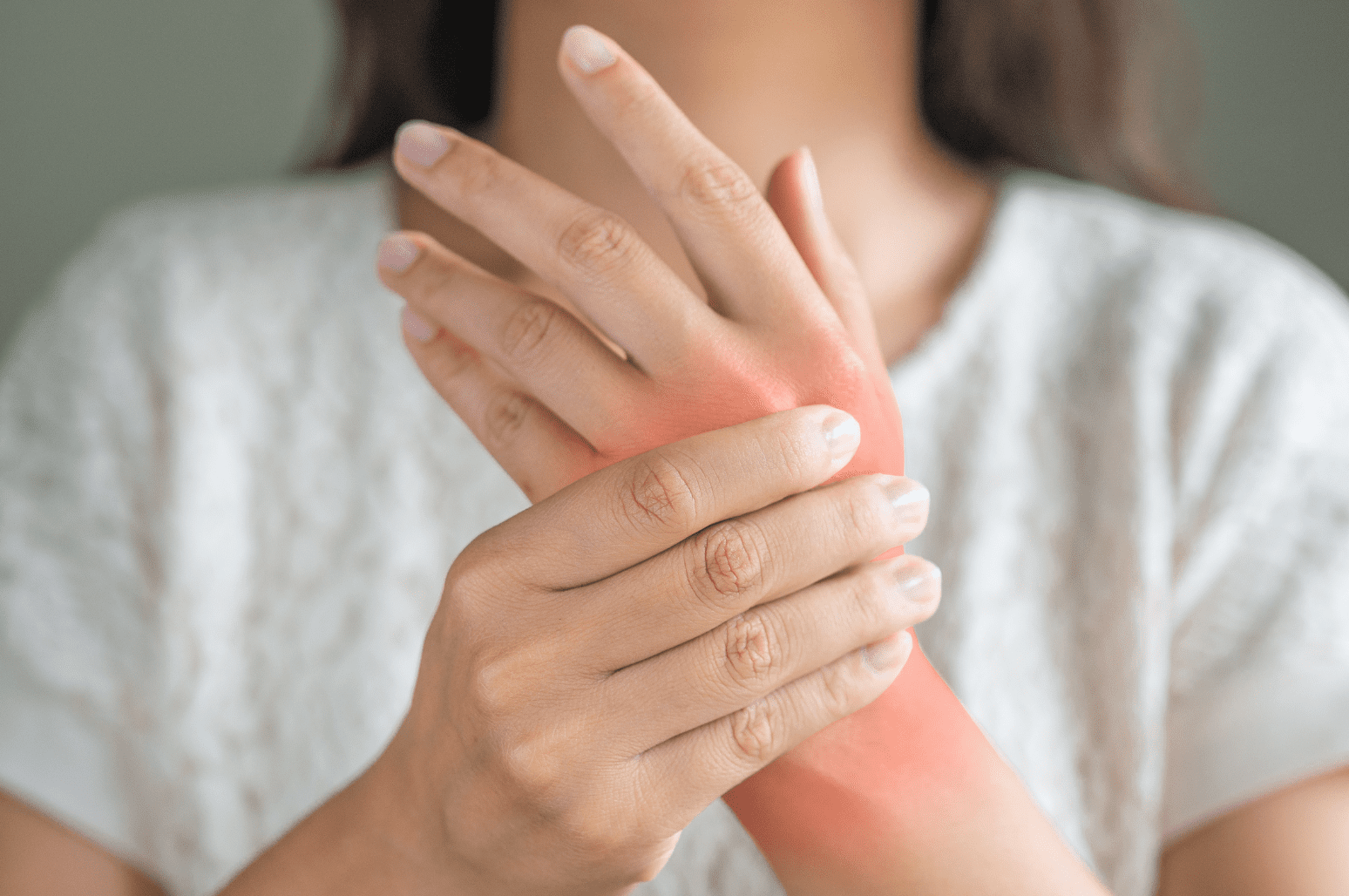
Migraines are no fun. Dealing with the pulsing, throbbing, and aching pains in your head makes it difficult to think or do just about anything! You might be wondering if a ketogenic diet can help with migraines. Let’s discuss the research and mechanisms regarding how going keto might soothe your painful head.
Migraines and Keto
The ketogenic diet is rich in fat, moderate in protein, and low in carbohydrates. It’s long been studied and used as a treatment for epilepsy and other neurological conditions.
On keto, you lower carbs found in a range of foods, such as bread, cereals, pasta, fruits, certain dairy products, and starchy veggies like potatoes. Your body normally breaks down the carbs in these foods into glucose to give your cells energy. When you restrict carbs, your body needs an alternative fuel source to meet your energy needs [1].
On a ketogenic diet, your body breaks down fats in your liver to produce ketones. Your body and brain can efficiently use ketones for energy. Your body enters a metabolic state called ketosis, where your blood ketone levels rise. Some experts suggest these ketones might be protective against migraines [2].
A migraine refers to moderate to severe pulsing or throbbing pain, typically on one side of your head [3]. Migraines are often accompanied by other symptoms, such as light and sound sensitivity and nausea.
It isn’t clear exactly how the ketones help with migraines, but it could be because the ketones restore brain energy metabolism and help counteract brain inflammation. Inflammation might play a role with migraines and the ketogenic diet has been shown to have anti-inflammatory effects [4] [5] [6] [7].
Benefits of Ketones
Research has long suggested the ketogenic way of eating might be beneficial for treating or preventing migraines. Impressively in 1928, the first medical literature reported that 39% of people experienced an improvement in migraine severity and frequency with a keto diet! [8].
A 1930 study showed 28% of people with migraine who followed a ketogenic diet had no migraine attacks for up to 3 months after entering ketosis. Another 25% noted less frequent or less severe migraine attacks [9].
Interest in the keto diet for migraine declined, possibly due to the development of allopathic over-the-counter prescription medications to manage the condition.
A 2015 observational study resulted in a drastic reduction in migraine frequency in women who followed a low-calorie keto diet for 1 month, compared to a standard low-calorie diet [10]. Women who followed the keto diet lost significantly more weight, which suggests the reduction in migraine frequency might also be connected to weight loss.
Researchers performed a follow-up study and showed participants with migraines experienced an average of three fewer attacks monthly while on a very low-calorie keto diet, compared to a very low-calorie non-keto diet. This was despite similar weight loss occurring with both diets.
Another study showed drastic reductions in migraine duration, severity, and frequency after a 1-month keto diet [11].
Concluding Thoughts
The current research suggests a ketogenic diet might help reduce migraine duration, severity, and frequency. It isn’t definitive why this happens, and more research specifically on the ketogenic diet and migraines is needed to draw a clearer conclusion. Many people note improvements with a range of symptoms and conditions when switching to a ketogenic diet.
The studies thus far were performed in obese or overweight adults based on body mass index (BMI). It’s unknown whether adults with a normal BMI would experience the same effects. Other variables should also be considered, such as the geographical location and setting of the studies.
Some researchers are looking at whether ketone supplements prevent migraines. Ketone supplements are exogenous ketones — ketones coming from an outside source. Ketone supplements might also be effective for managing migraine attacks.
Has a Ketogenic Diet Helped with Your Migraines?
Share your experience with the ketogenic diet and migraines. Has going keto given you relief?
References
Shilpa, J., & Mohan, V. (2018). Ketogenic diets: Boon or bane? Indian J Med Res, 148(3), 251-253. DOI: 10.4103/ijmr.IJMR_1666_18
Gross, E. C., Klement, R. J., Schoenen, J., D’Agostino, D. P., & Fischer, D. (2019). Potential protective mechanisms of ketone bodies in migraine prevention. Nutrients, 11(4), 811. DOI: 10.3390/nu11040811
Burstein, R., Noseda, R., & Borsook, D. (2015). Migraine: Multiple processes complex pathophysiology. J Neurosci, 35(17), 6619-6629. DOI: 10.1523/JNEUROSCI.0373-15.2015
Barbanti, P., Fofi, L., Aurilia, C., Egeo, G., & Caprio, M. (2017). Ketogenic diet in migraine: Rationale, findings, and perspectives. Neurol Sci, DOI: 10.1007/s10072-017-2889-6
McDonald, T. J. W., & Cervenka, M. C. (2018). Ketogenic diets for adult neurological disorders. Neurotherapeutics, 15(4), 1018-1031. DOI: 10.1007/s13311-018-0666-8
Di Lorenzo, C., Coppola, G., Bracaglia, M., Di Lenola, D., Evangelista, M., Sirianni, G., Rossi, P., Di Lorenxo, G., Serrao, M., Parisi, V., & Pierelli, F. (2016). Coritcal functional correlates of responsiveness to short-lasting preventive intervention with ketogenic diet in migraine: A multimodal evoked potentials study. J Headache Pain, DOI: 10.1186/s10194-016-0650-9
Di Lorenzo, C., Coppola, G., Bracaglia, M., Di Lenola, D., Sirianni, G., Rossi, P., Di Lorenzo, G., Parisi, V., Serrao, M., Cervenka, M. C., & Pierelli, F. (2019). A ketogenic diet normalizes interictal cortical but not subcortical responsivity in migraineurs. BMC Neurol, DOI: 10.1186/s12883-019-1351-1
Schnabel, T. G. (1928). An experience with a ketogenic dietary in migraine. Annals of Internal Medicine, https://doi.org/10.7326/0003-4819-2-4-341
Barborka, C. J. (1930). Migraine results of treatment by ketogenic diet in fifty cases. JAMA, 95(24), 1825-1828.
Di Lorenzo, C., Coppola, G., Sirianni, G., Di Lorenzo, G., Bracaglia, M., Di Lenola, D., Siracusano, A., Rossi, P., & Pierelli, F. (2015). Migraine improvement during short lasting ketogenesis: A proof-of-concept study. Eur J Neurol, 22(1), 170-177. DOI: 10.1111/ene.12550
Di Lorenzo, C., Pinto, A., Lenca, R., Coppola, G., Sirianni, G., Di Lorenzo, G., Parisi, V., Serrao, M., Spagnoli, A., Vestri, A., Schoenen, J., Donini, L. M., & Pierelli, F. (2019). A randomized double-blind, cross-over trial of very low-calorie diet in overweight migraine patients: A possible role for ketones. Nutrients, 11(8), 1742. DOI: 10.3390/nu11081742








